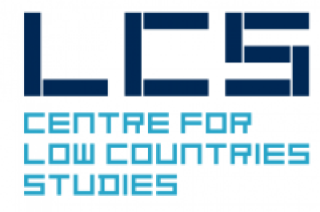Low Countries Events
Forthcoming Events
- Click here to see our news and events
Past Events
2017
- BelgoLab 2017 - Belgian Translations (6-7 March 2017)
Translation plays a major role in Belgian culture, both domestically - by enabling readers to access work produced in a different language community - and internationally, by disseminating work to wider audiences. Accordingly, BeLgoLab 2017 is devoted to translations of different kinds. It combines formal papers and discussions with practical workshops, where published English translations are
compared with the originals (guidance materials supplied for non-specialists). The event is aimed at researchers and postgraduates in Comparative Literature and Translation Studies, as well as those in French and Dutch studies.
Monday 6 March 2017
Eliot Room, British Library Knowledge Centre, 96 Euston Road, London NW1 2DB
Bookings for this session via dutch-enquiries@bl.uk
1330 - 1400 Registration
1400 - 1410 Welcome Adrian Armstrong (Queen Mary University of London), Marja Kingma (British Library)
1410 - 1525 Workshop on translation: Amélie Nothomb, 'Fear and Trembling' ('Stupeur et tremblements') Adrian Armstrong
Materials (from the published translation and the original) will be distributed on the day
1525 - 1545 Tea/coffee
1545 - 1700 Workshop on translation: Paul van Ostaijen, 'Occupied City' ('Bezette Stad') Jane Fenoulhet (University College London)
Materials (from the published translation and the original) will be distributed on the day
1700 - 1800 Reception, kindly supported by the Embassy of the Kingdom of Belgium in London.
Tuesday 7 March 2017
Institute for Modern Languages Research (SAS, UoL) Senate House G35
Bookings for this session via www.sas.ac.uk/events/event/7189
0900 - 0915 Welcome Adrian Armstrong, Marja Kingma
0915 - 0945 Translator's choices in the literary field: Alex Brotherton's translation of Gerard Walschap's 'Marriage/Ordeal' ('Trouwen', 'Celibaat'), Irving Wolters (University College London)
0945 - 1015 From Mobutu to Molenbeek: Cultural Translation in Contemporary Belgian Ethnic-Minority Writing in French, Sarah Arens (University of Edinburgh)
1015 - 1030 Discussion
1030 - 1045 Tea/coffee
1045 - 1145 Round table: Translation and Belgium Adrian Armstrong, Marja Kingma
In partnership with the Institute for Modern Language Research (IMLR), School of Advanced Studies, University of London.
For more information see this post on the British Library European Studies blog.
- Tuesday 21 February 2017: Literary evening with Carmien Michels
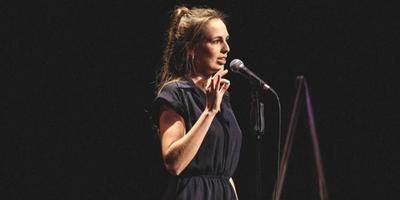
Join us for an exciting literary evening with Carmien Michels. Carmien graduated from the Royal Conservatory in Antwerp, where she trained in word craft. She has published two novels and is often seen on stage giving prizewinning performances of her poetry. In 2016 she was crowned European Poetry Slam champion.
Carmien will perform mainly in Dutch with English translations available.
This event is generously funded by Flanders House.The event is FREE but please register via Eventbrite.
Date and Time
Tue 21 February 2017
18:00 - 19:30 GMT
Location
Common Room 307 Foster Court
UCL
Gower Street
London
WC1E6BT
View Map
There will be a drinks reception and a chance to talk to Carmien!- 30 November 2016 and 11 January 2017: Dutch detectives book club
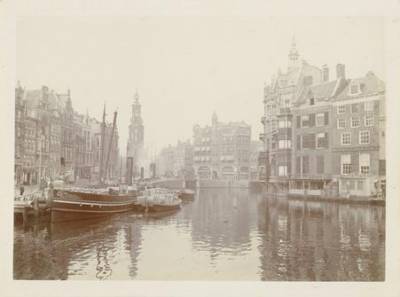
6.30pm, SELCS common room, G24, Foster Court, UCL, WC1E 6BT
Sign up via Eventbrite! We would like to encourage participants to attend both sessions.
The 11 January session had to be postponed to a later date. The new date will be announced soon.
Inspector van der Valk, created by Nicolas Freeling, works for the Amsterdam police and does not believe in playing it by the book. Come and join our book club and get to know him better. We will also be introducing you to a new Dutch detective, Henk van der Pol.
We launch the book club on 30 November 2016 with Freeling's Double-Barrel, first published in 1964 (any edition; Amazon has a selection of second-hand copies), Discussion will be led by Jane Fenoulhet and Daniel Pembrey, creator of Van der Pol, whose book The Harbour Master will be published in November and will be our second discussion book on 11 January 2017.
The Kindle edition of The Harbour Master is currently available for only £0.99!
- 2nd Postgraduate Colloquium in Low Countries Studies (London, 6th-7th July 2017)
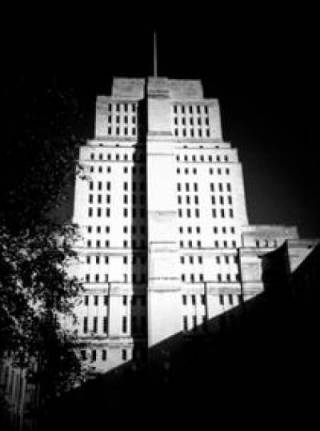
In just under two weeks postgraduate students of Dutch and Flemish history, literature, translation studies and sociology will come together for the second edition of the ALCS Postgraduate Colloquium. This international meeting is designed to foster links between British and Irish Low Countries Studies and scholars from other countries, and to support the next generation of researchers in our field. The conference will take place in the medium of English and we welcome anyone with a curiosity about the Netherlands and Flanders or any of the topics up for discussion. This year's papers are particularly exciting, with strong themes of identity, ideology and transnationality emerging. The keynote will be given by our chair, Henriette Louwerse (University of Sheffield). The conference fee of £15 is payable by those receiving research funding or in full-time work, all students and unwaged researchers are welcome to join free of charge. If you would like to attend, please email pglowcountriesstudies@gmail.com so that we can factor you into our catering arrangements. Details of excursions and dinner plans to follow.
ALCS Postgraduate Colloqium Senate House, London
Thursday 6th July
09.30-10.00: Arrival and Registration
10.00 - 11.00: Keynote Henriette Louwerse (University of Sheffield): 'Multicultural Present and Colonial Past: The Case of the Netherlands'11.00 - 11.30: COFFEE
11.30 - 13.00 Panel 1 Chair: Nick Piercey (Manchester Metropolitan University)
Rianti D. Manullang (University of Leiden): 'The Stories of Indigenous Bataks in Sumatra through the "Imperial Eyes" of the Colonial Travelers'
Paola Gentile (KU Leuven): 'The Image of the Netherlands in Italian Literary Translation - A Socio-imagological Approach'
13.00 - 14.00 LUNCH
14.00 - 15.00 Panel 2 Chair: Marja Kingma (British Library)Zsuzsa Toth (University of Debrecen): 'The Reception of Jo van Ammers-Küller by the Hungarian Press in the First Half of the 20th Century'
Cristina Peligra (Newcastle University): 'Re-presenting Identity and Colonial Legacy. Comparing English and Italian translations of Hella Haasse's "Indische Romans"'
15.00 - 15.30 Research Training and Q&A Introduction to the British Library Dutch Collections by Marja Kingma
15.30-15.45 COFFEE15.45 - 16.45 Panel 3 Chair: Henriette Louwerse
Cyd Sturgess (University of Sheffield): 'Fashioning queer femininities in Josine Reulin's Terug naar het eiland (1937)'
Joske van de Vis (University of Leiden): 'The Bakhtian Analysis of Tonnus Oosterhoff's Digital Poems'
17.00 - 19.00 Free Excursion (details to follow)
19.00 DINNER (Optional, self-funded)
Friday 7th July
09.30 - 10.00 COFFEE
10.00 - 11.30 Panel 4 Chair: tbc
Carmen Verhoeven (Utrecht University): 'Divided by Mars, united by Rhetorica: Concord and discord on the Mechelen rhetorician contest of 1620'
Marion Prinse: 'Processes of Radicalisation in pre-WWI Flemish Nationalist Literature'
11.30-12.30 Activity (tbc)
12.30 - 13.30 LUNCH
13.30 - 14.30 Panel 6 Chair: Cyd Sturgess (University of Sheffield)
Karen van Hove (KU Leuven): 'Pornography, yes or no? - Literary and pornographic interactions'
Jenny Watson (University of Sheffield): 'Father literature - a transnational trend, a trans-temporal phenomenon?'
14.30 - 16.00 Workshop/postgrad training Questioning the Canon, Building the Discipline.
16.00 -18.00 CLOSE AND DRINKS (Optional, self-funded)
2016
- 18 November 2016: Low Countries History seminar
5.15pm, Room tbc, IHR, Senate House, WC1E 7HU.
David Freeman (Kansas City) will give a talk on 'A Silver River in a Silver World: Dutch merchants in the South Atlantic, 1640s-1740s' in a joint session with the Economic and Social History of the Early Modern World seminar.
For more details please see the IHR website.
- 17 November 2016: Symposium on Geyl in Britain, 1914-1935
- Fifty years ago, on 31 December 1966, Pieter Geyl passed away. He was arguably one of the most internationally known historians from the Netherlands, and one of the most controversial at that. Having come to the UK as a journalist in the first place, he started his academic career at UCL in the aftermath of World War I, with the first endowed Chair for Dutch Studies in the Anglophone world (1919). Known for his re-interpretation of the 16th century Dutch Revolt against the Habsburgs as well as for his political activism in favour of the Flemish movement in Belgium, and for his provocative debates with British historians like Arnold Toynbee, he left his stamp on the British perception of Low Countries history and culture, before leaving London in 1935 to accept a Chair in Utrecht.
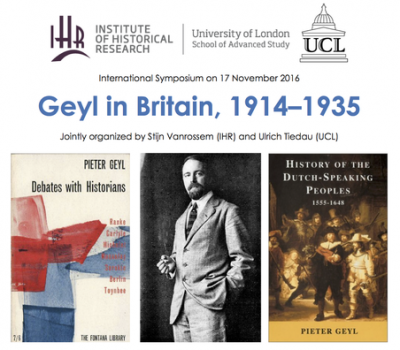
The department and libraries he built up at UCL and former Bedford College remain at the heart of the Dutch collections of UCL and the IHR to the present day and make London one of the largest centres for the study of Low Countries history and culture outside of the Low Countries. On the occasion of his fiftieth obit, as well as the approaching centenary of his nomination and the foundation of Dutch Studies in Britain, this symposium aims to re-examine Geyl's time in Britain and shed new light on his multifaceted work as a historian, journalist, translator, activist and homo politicus, his contemporary networks, as well as on his lasting legacy on British views of Dutch and Belgian history.
Jointly organized by Stijn Vanrossem (IHR) and Ulrich Tiedau (UCL) We are grateful for generous sponsorship by the IHR, the Royal Netherlands Embassy and the Association for Low Countries Studies (ALCS).http://www.sas.ac.uk/support-research/public-events/2016/pieter-geyl-symposium
- 4 November 2016: Low Countries History seminar
5.15pm, Room N304, IHR, 3rd floor, North block, Senate House, WC1E 7HU.
Stijn van Rossem (London) will give a talk on 'Editorial Strategies in the early-modern period: the Verdussen case (Antwerp, 1590-1690)'.
For more details please see the IHR website.
- 3 November 2016: Lunch hour lecture by Dr Nick Piercey on 'Paying the penalty: the sporting prison'
Location
13:15-13:55 | Darwin Lecture Theatre | Darwin Building (Map)
access via Malet Place | London | WC1E 6BT | United KingdomSpeaker information

How do sporting cultures help shape the world around us? And how do the stories historians tell about them shape the present and future? This talk will examine how the history of early Dutch football can be intimately linked to discourses of values that aimed to construct more disciplined, useful and docile citizens.
Watching the live stream or in the audience? Ask questions using audience interaction website sli.do by using the link below and event code #8554. All questions will be moderated by a UCL staff member.
Contact
UCL Event Ticketing
020 3108 1000 (internal: 51000, Mon-Fri, 12 noon-6pm) | ticketing@ucl.ac.ukThe lecture is open to all and there is no need to register.
Links
Download Nick's book Four Histories about Early Dutch Football FREE from UCL Press!
- 21 October 2016: Low Countries History seminar
5.15pm, Wolfson Room NB01, Basement, IHR, North block, Senate House, WC1E 7HU.
Bruno Blondé (Antwerp) will give a talk on 'The straw mattresses of a love triangle: Economic growth, social inequality and early modern consumer changes in the eighteenth-century Low Countries'.
For more details please see the IHR website.
- 25 October 2016: Rudolf Dekker on the Diary of Constantijn Huygens Jr
Tuesday 25 October | 6.30pm | Gustave Tuck lecture theatre, 2nd Floor, South Junction, Wilkins Building, Gower Street, WC1E 6BT
Register for free tickets via Eventbrite
Join us for our 2016 annual lecture on 'The Diary of Constantijn Huygens Jr (1628-1697), Secretary to King William of Orange: Life in London and The Hague seen through the eyes of a Dutch Pepys'.
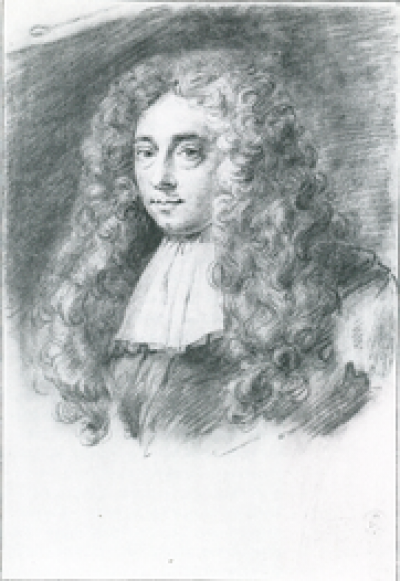
Constantijn Huygens Jr, the secretary to Stadholder-King William of Orange, kept a diary during most of his life. In his diary he wrote about his private and professional life, about politics in the Dutch Republic and England, and about the military campaigns he witnessed, including the Glorious Revolution and the Battle of the Boyne. From 1688 to 1696 he spent much of his time in London. He wrote often about his interest in science and about his brother, Christiaan Huygens. The diary also documents his role as book collector and as connoisseur of art. Finally, Huygens was a zealous chronicler of scandals and gossip, which is why he has been called a Dutch Samuel Pepys. His secret diary is a unique egodocument of the Dutch Golden Age.
Rudolf Dekker studied history at the University of Amsterdam and wrote a dissertation on riots and revolts in the 17th century. He taught history at the Erasmus University Rotterdam (1981-2010) and directs the research group "Egodocuments and History" at the Huizinga Institute, Research School for Cultural History (University of Amsterdam). Recently he published The Diary of Constantijn Huyhes Jr (Panchaud 2015), an English translation of a selection of the Huygens diary, and Family, Culture and Society in the Diary of Constantijn Huygens Jr (Brill 2013). He also wrote about the current situation of the Dutch academic world, The Road to Excellent Ruin. Dutch Universities, Past, Present and Future (Panchaud 2015). Other books include Child of the Enlightenment, Revolutionary Europe reflected in a Boyhood Diary (Brill 2009), with Arianne Baggerman, Humour in Dutch Culture of the Golden Age (Palgrave 2001) and The Tradition of Female Transvestism in Early Modern Europe (Macmillan 1989), with Lotte van de Pol. He also wrote a history of the Netherlands: Meer verleden dan toekomst. Geschiedenis van verdwijnend Nederland (Bert Bakker 2008).
The talk will be followed by a reception in the South Cloisters.
- 8 June 2016: Book launch - 'We and Me' by Saskia de Coster at Flanders House*
Publishing house World Editions and the General Representation of the Government of Flanders cordially invite you to the book launch of
We and Me
by Saskia De Coster
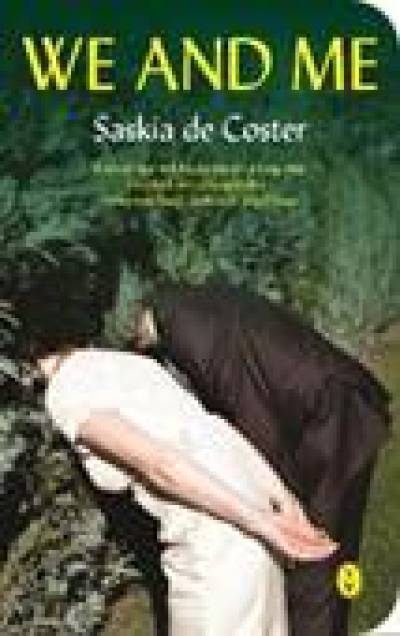
Join us on Wednesday, 8th June at 19:00 at Flanders House for the launch of a brilliant, incisive novel that dissects the lives of a dysfunctional, yet bourgeois, family; a literary Desperate Housewives and a European response to Jonathan Franzen's Freedom.
This fascinating literary evening will feature a reading from We and Me by Saskia followed by a question and answer session.
RSVP to hallam@ruthkillick.co.uk As seats are limited, please reply early.
More information about We and Me and the author: http://www.worldeditions.org/all-books/expected/we-and-me/
Flanders House
1A Cavendish Square
W1G 0LD London
- 26 May 2016: Nick Piercey on 'Is sport really good for us?'
12:15-12:45, IAS seminar room 20, South Wing, Wilkins Building, UCL, WC1E 6BT
Dr Nick Piercey, acting Director of the Centre for Low Countries Studies and Honorary Research Associate at UCL, will consider whether sport is really good for us.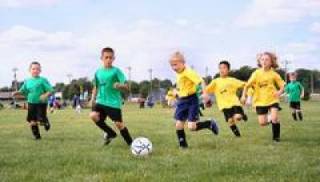
'Despite recent stories demonstrating the physical dangers of sport, sporting organisations and a range of politicians are keen to emphasise the positive physical and mental aspects of sport for individuals and society as a whole. But what are the wider cultural and social effects of sport?
Is sport a useful cultural activity for bringing people together or something that blinds us to the inherent nationalist, capitalist and discriminatory nature of modern society?
Is sport something that encourages human expression, or something that constricts us within certain patterns, orders and rules? Does it promote health or physical self-abuse?
In this talk I will look at how different people have attempted to answer these questions and I will put forward my own approach to the cultural role of sport in wider society and will question whether sport is really good for us?'
This talk is part of UCL's Festival of Culture.
- 25 May 2016: Dutch taster session with Christine Sas
12:45 to 13:30, Darwin B15 - entrance via Malet Place, UCL, WC1E 6BT
Hallo en welkom op het festival van cultuur!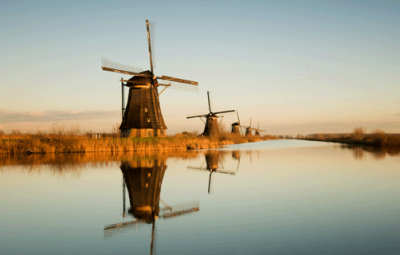
Come along for a taste of Dutch: a language that is very close to English and arguably the easiest one for native English speakers to learn. You will learn about the areas where the language is spoken, its links with English, and have a go at some tongue twisters. By the end of the session, you will be able to introduce yourself confidently in Dutch. You'll also be able to listen to a real life fairy tale- and actually understand most of it!
This event is part of UCL's Festival of Culture.
- 24 May 2016: Dutch Values: a conversation with Bas Heijne and Simon Kuper
- Join us for an evening of debate on Dutch values at the Dutch Church, chaired by author and journalist Joris Luyendijk.
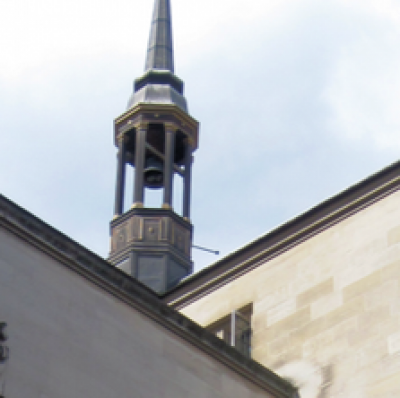
Bas Heijne is a writer and columnist at the NRC Handelsblad. A collection of his columns was published as Hollandse toestanden (in Dutch).
Simon Kuper is a columnist at the Financial Times and has written extensively on topics from politics and literature to football.
The debate will be held in English and all are welcome!
See the Dutch Church website for more information.
- 23 May 2016: The EU Referendum - Cultural Perspectives
6.30-8pm, Roberts G06 Sir Ambrose Fleming Lecture Theatre, Roberts Building, UCL, WC1E 6BT
As part of UCL's Festival of Culture, join us for a debate on the cultural, historical, political, and philosophical issues raised by the upcoming UK-EU Referendum.
This panel event will consider the role of the EU and the upcoming UK-EU referendum from a number of different perspectives - cultural, historical, and political, among others. We will be joined by Simon Smits, the Dutch Ambassador to the United Kingdom and formerly the Director-General for Foreign Economic Relations in The Hague. The event will follow a 'Question Time' style format, with opportunity for audience questions and discussion.
Also participating in the panel are: Jane Fenoulhet (Professor of Dutch Studies and Director of the Centre for Low Countries Studies), Jo Wolff (Professor of Philosophy and Dean of Arts and Humanities), Mark Hewitson (Professor of German History and Politics) and Susan Collins (Professor of Fine Art and Director of the Slade School of Fine Art). The event will be followed by a drinks reception.
- 10 March 2016: Poetry evening with Vrouwkje Tuinman
6-7pm, Foster Court 307, Malet Place, UCL, WC1E 6BT
Join us for a literary evening and drinks reception. Non-Dutch speakers are very welcome!

Vrouwkje Tuinman has written five poetry collections and won the 2010 Halewijn prize. Her photobook with photographer Andrea Stultiens won the Niek Woudenberg prize in 2012.
Vrouwkje's audiobook Winterslaap is available to listen online.
Vrouwkje will perform and discuss a selection of poetry and prose. Questions from the audience are welcome and the talk will be followed by a drinks reception.
Vrouwkje's travel to UCL is generously funded by the Letterenfonds.- 3 March 2016: Dr Francis Jones on Biography as networked action*
6.30-8pm, Archaeology Lecture Theatre G6, UCL Institute of Archaeology, 31-34 Gordon Square, WC1H 0PY
Free tickets via Eventbrite! Part of the UCL Translation in History Lecture Series
Biography as networked action: James S. Holmes, poetry translator
James S. Holmes (1924-1986) was not only a founding father of translation studies, but also one of his generation's main Dutch-English poetry translators and poetry-translation editors. This talk uses his poetry translation career as a case study of a "dedicated expert" - someone who devotes their working life to transmitting poetry between two languages. I use a large-ish bibliographical database of his translation output to establish Holmes's working networks with poets and other translators. This approach, I argue, gives an alternative to the 'narrative of the heroic individual' as a model for translator biography, and shows how being a dedicated poetry-translation expert involves working in - and creating - a mesh of professional relationships.
The last of six lectures in the fourth UCL Translation in History Series, investigating the role of key figures and movements in the historical development of the theory and practice of translation. Convened by Geraldine Brodie, Silvia Kadiu and Anna Ponomareva (UCL Translation Studies).
- 25 February 2016: Literary evening with Rebekka de Wit
6-7pm, A&H common room, G24, Foster Court, Malet Place, UCL, WC1E 6BT
Join us for an exciting literary evening with Rebekka de Wit. Rebekka graduated from the Royal Conservatory in Antwerp, where she trained in word craft. Her graduation performance won a KBC prize at the Theater Aan Zee festival in Ostend and her debut novel We komen nog één wonder tekort (We're Short by Just One Miracle) was published in 2015.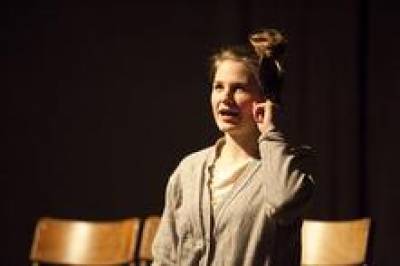
Rebekka has written about Venice and Antwerp for the citybooks project.There will be a drinks reception and a chance to talk to Rebekka!
This event is generously funded by Flanders House and the Netherlands Embassy.
- 23 February 2016: Dutch Values: a conversation with Paul Scheffer and Coen Teulings
7-8.30pm, Dutch Church, 7 Austin Friars, London EC2N 2HA
Join us for an evening of debate on Dutch values at the Dutch Church.
Paul Scheffer is professor of European Studies at Tilburg University and his essay in 2000 on The multicultural drama was very influential in shaping the debate on multiculturalism and immigration in the Netherlands. He has recently written on the refugee crisis in the NRC (in Dutch).
Coen Teulings is professor of Industrial Relations at the University of Cambridge and former Managing Director of the CPB Netherlands Bureau for Economic Policy Analysis. He has published a critical response to Scheffer's article, also in the NRC (in Dutch).
The debate will be held in English and all are welcome! Keep an eye out for our podcast following the event.- 4 February 2016: Irvin Wolters on the Bibliotheca Neerlandica
6-7pm, Foster Court 307, with refreshments from 5.30pm
Join us for a research seminar by Irvin Wolters, PhD student at UCL Dutch, on 'The Bibliotheca Neerlandica: Why did it fail to contribute to the literature of the English speaking world?'
'Dutch and Flemish artists are appreciated throughout the world, but their counterparts in literature have remained comparatively unknown abroad because of the language barrier. Few spoke the Dutch language or knew enough about it to realize its translation.
Despite funding from the Belgian and Dutch governments and expertise from publishing companies and translators, a series of translated Dutch and Flemish literary works published between 1963 and 1967 and titled the Bibliotheca Neerlandica failed to make an impact on literary readers in the English speaking world.
I would like to offer some suggestions as to why this failure occurred.'
2015
- 9 December 2015: Visiting Scholar Jeroen Dewulf on Stefan Zweig*
Blaise Cendrars and the Nietzschean Roots of the Multiracial Identity Concept in Stefan Zweig's Brazil: Land of the Future (1941)
5pm, Seng Tee Lee Centre, Senate House, Malet Street, WC1E 7HU
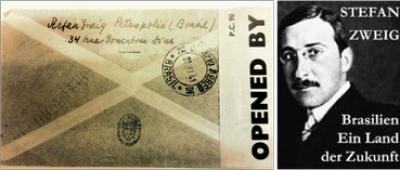
(image: Klemens Renoldner, Stefan Zweig. Bilder, Texte, Dokumente. Wien 1993)
Jeroen Dewulf's lecture promotes a better understanding of the complexities involving Zweig's portrayal of Brazil in Brasilien. Ein Land der Zukunft (Brazil: Land of the Future, 1941) by analyzing his encounter with this South American country parallel to that of the French modernist Blaise Cendrars.
The discussion will be chaired by Professor Rüdiger Görner, Chair of German in the School of Languages, Linguistics and Film, Queen Mary University London and Professor Mark Thurner, Reader in Latin American Studies, University of London.
Refreshments will be served.
- 8 December 2015: 'A Strong Barbaric Accent' - Annual lecture by Professor Jeroen Dewulf
6.30pm, Gustave Tuck Lecture Theatre, Wilkins Building, UCL, WC1E 6BT
Followed by a reception in the IAS Common Ground. RSVP via Eventbrite
Professor Jeroen Dewulf from UC Berkeley will be visiting the Centre in December 2015. As visiting scholar, Professor Dewulf will give this year's annual lecture
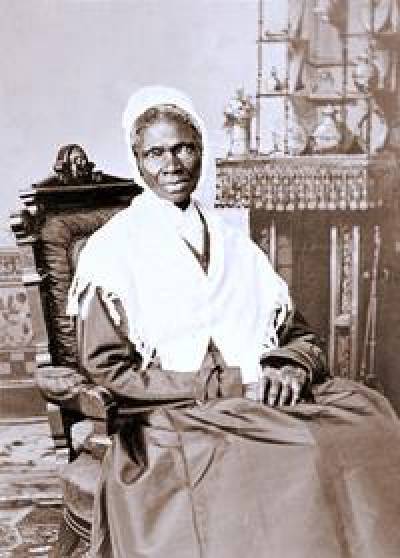
'A Strong Barbaric Accent': America's Dutch-Speaking Black Community from Seventeenth Century New Netherland to Nineteenth Century New York and New Jersey
Although it is estimated that as late as the mid-eighteenth century some sixteen to twenty percent of the slaves in New York and New Jersey spoke (some) Dutch, very little research has been done on America's Dutch-speaking black community.
Despite the paucity of sources, this talk attempts to provide an overview of the importance of the Dutch language for the black community from the seventeenth-century colony of New Netherland to nineteenth-century New York and New Jersey. It also raises the question of whether not only Dutch-speaking whites, but also blacks may have played a role in the transmission of Dutch linguistic elements into American English.
With thanks to our co-host, the UCL Institute of Advanced Studies
- 7 December 2015: Research seminar with Gail Zuckerwise
5-6pm, SELCS common room, Foster Court 307, UCL
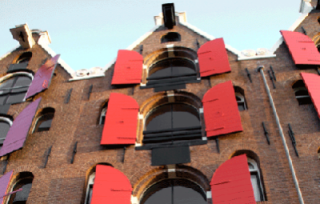
Join us for a research seminar led by Gail Zuckerwise. Gail's PhD project addresses the relationship between the concept of culture in cultural policies and the culture that is attributed to the identity of Amsterdam. This is achieved through case studies that analyze the governmentality of reform in relation to identities, industries, places and practices that are associated with culture in Amsterdam.
- 27 October 2015: Book launch, Herman Gorter translated by Paul Vincent
Join us for the launch of Paul Vincent's new translation of poetry by Herman Gorter, published this month with UCL Press. Paul will introduce his new translation and read a few poems from the collection.
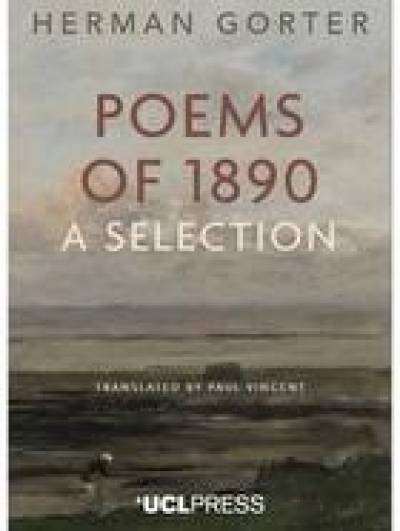
The poet
Commonly viewed as a revolutionary and propagandist Herman Gorter (1864-1927) is often overlooked despite his lasting contribution to Dutch poetry. This new selection of thirty-one poems focuses on Gorter's experimental love and nature lyrics in Poems of 1890, and the Introduction sets the poems in the context of his earlier seminal work 'Mei' (May) as well as his often neglected Socialist verse.
The translator
Paul Vincent became a full-time translator in 1989, after teaching Dutch at the University of London for over twenty years. He has translated a wide variety of poetry, non-fiction and fiction. In 2011, having twice won the Reid Poetry Translation Prize, he was awarded the Vondel Dutch Translation Prize for his version of Louis Paul Boon's My Little War.
The publisher
UCL Press is the first fully Open Access University Press in the UK. It seeks to use modern technologies and 21st-century means of publishing/dissemination radically to change the prevailing models for the publication of research outputs. Grounded in the Open Science/Open Scholarship agenda, UCL Press will seek to make its published outputs available to a global audience, irrespective of their ability to pay, because UCL believes that this is the best way to tackle global Grand Challenges such as poverty, disease, and hunger.
Download Herman Gorter: Poems of 1890 for free via UCL Press
This event is kindly sponsored by UCL Press
- 23 September 2015: Launch of new poetry anthology
7pm, London Review Bookshop, 14 Bury Place, London, WC1A 2JL.
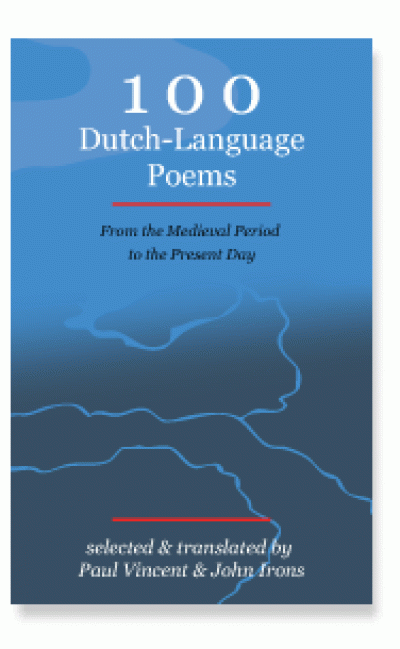
Holland Park Press has announced the launch of a new anthology of Dutch-language poetry due out in September: 100 Dutch-Language Poems - From the Medieval Period to the Present Day.
At the launch Paul Vincent and John Irons, who selected and translated the poems, will talk about how and why the anthology was put together.
Two leading Dutch poets, Jules Deelder and Tonnes Oostehoff, have been invited to read their poems from the collection plus some of their other poems.
Jules Deelder is a bestselling Dutch poet and writer and is also known as the night mayor of Rotterdam. He is a performance poet in the tradition of the Beat Generation, and renowned in the Netherlands for his appearances in Dutch media. His recurring themes are Rotterdam, drugs, jazz and the Second World War.
Tonnus Oostehoff is an award-winning Dutch poet and writer. His work is characterised by the use of subtle humour and the need to reinvent itself continuously. In 2012 he was awarded the PC Hooft prize for his 'highly renewing poetry'. In 2001 he launched his website for moving poems.
For more details and to RSVP please visit the Holland Park Press website.
- 18 September 2015: Metalpoint drawing at the British Museum
5:30pm: Talk at UCL and exhibition visit, booking essential
Rogier van der Weyden, Portrait of an unknown young woman. Silverpoint on cream prepared paper, c. 1434-1440.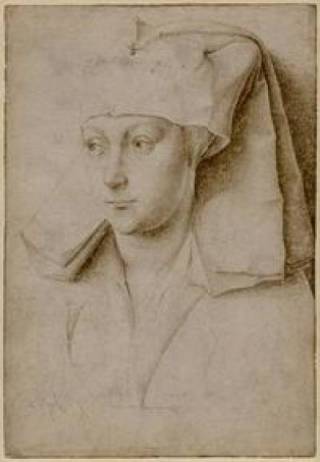
Forget painting - these works are really made of gold (or silver)! From the Renaissance to the modern day, drawing in metalpoint has been explored by artists ranging from Rogier van der Weyden, Leonardo da Vinci, Albrecht Dürer and Rembrandt to Otto Dix and Jasper Johns.
A new exhibition at the British Museum (held in Room 90; 10 September - 6 December 2015) provides a once-in-a-lifetime opportunity to see around 100 exceptional drawings created by the greatest masters of this intriguing technique from the Late Middle Ages until the present day.
Join us for a talk on the exhibition and technique by curator An Van Camp, followed by a visit to the exhibition. This is a great opportunity - tickets are usually £8!
Important details
Booking is essential! Book free tickets via Eventbrite now and please select a time slot for entry to the exhibition.With many thanks to Flanders House, whose support has made this event possible.
Following the talk we will proceed in groups to the exhibition at the British Museum, a short walk from UCL. Curator An Van Camp will be available to answer questions during the exhibition visit, which will be self-guided. The exhibition will be open until 8.30pm. Refreshments will be served from 5pm in the Arts and Humanities Common Room, G24, Foster Court. The talk starts at 5.30pm at UCL. Venue: G02 Watson Lecture Theatre, Medawar Building, UCL, WC1E 6BT.- 2 and 3 July 2015: Drawing a Map
Postgraduate Colloquium on Low Countries Studies
The ALCS, IMLR, UCL and the University of Sheffield organised the very first Postgraduate Colloquium on Low Countries Studies in London. From the opening address by Ulrich Tiedau (UCL) and the five themed panel sessions over two days, an exciting, multidisciplinary and multinational map emerged. Read more about the colloquium on the ALCS website.
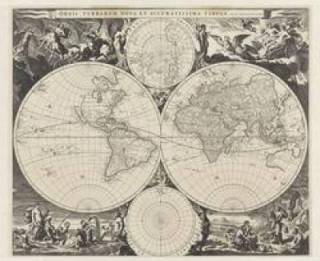
Conference programme
Thursday 2nd July
Garwood Lecture Theatre, UCL South Wing, Gower Street, London, WC1E 6BT
12.00-12.45 Arrival and Registration 12.45-13.00 Introduction and Welcome 13.00-14.00 Keynote: Ulrich Tiedau (UCL) A tale of two Chairs: Pieter Geyl (Dutch) and Emile Cammaerts (Belgian) at the University of London, 1919-1935 (Chair: Aimeé Hardy) 14.00-14.30 Coffee 14.30-15.30 Panel One: Chair - Richard McClelland (KCL) Talitha M. G. Schepers (Christ's College, Cambridge): The Representation of Intercultural Encounters as Witnessed by Flemish Artists Travelling within a Diplomatic Context to the Islamic world (1400-1550)
Sabine Waasdorp (Utrecht): The Representation of Mary II as Queen and King in Dutch Pamphlets
15.30-15.45 Coffee 16.00 Walking tour of Dutch London
Friday 3rd JulyRoom 246, Senate House, Malet Street, London, WC1E 7HU
10.00-10.30 Arrival and Coffee 10.30-11.30 Panel Two: Chair - Richard McClelland (KCL) Floor Naber and Kim Smeenk (Utrecht): The International Cultural Network of Simon Vinkenoog in the Sixties
Ruth Clemens (UCL): Becoming-Imperceptible in Nooteboom's Het volgende verhaal
11.30-12.30 Panel Three: Chair - Cyd Sturgess (Sheffield) Christina Barningham (Sheffield): Hybrid Undertaking: Belonging and Individuality in Rachida Lamrabet's novel De man die niet begraven wilde worden
Aimée Hardy (UCL): Crises of Subjectivity: An Exploration of Belonging in Een Kind van God by Rachida Lamrabet.
12.30-14.00 Lunch - Provided 14.00-15.30 Panel Four: Chair - Jenny Watson (Swansea) Nicholas Piercey (UCL): Conflict in Amsterdam: Vignettes from a Neutral City (1914-1918)
Alisa van Kleef (Bonn): Drawing the map of Mitteleuropa? Cartographic Representations of the Low Countries as Portrayed in German Westforschung (1920-1945)
Cyd Sturgess (Sheffield): Navigating the Boundaries of Desire: Theories of Sexual "Inversion" and Sapphic Self-fashioning in Amsterdam (1930-1939)
15.30-15.45 Coffee 15.45-16.45 Panel Five: Chair - Richard McClelland Sophie Segers (VUB): A Case Study of ad hoc Interpreting at a Brussels Emergency Department
Eline Laperre (QMUL): Resilient Preverbal Negation in historical Dutch
17.00 Close - 1 July 2015: Dutch Encounters at De Hems
Exploring Stereotypes
On 1 July 2015 we organised a lively evening of short talks and discussion at Dutch bar De Hems. Our five speakers from UCL, the Netherlands Embassy and the Dutch Church presented a fascinating range of perspectives, with plenty of audience interaction!
To find out more about the event, read the blogs by audience members Michael Burns and Ruth Clemens.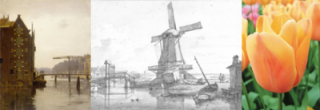
Speakers: Victoria Hall | Aimée Hardy | Nick Piercey | Joost Röselaers | Gail Zuckerwise
Dutch Encounters was funded by a UCL Beacon bursary.
- 16 April 2015: Cornelius Johnson at the National Portrait Gallery*
7pm, Room 5, National Portrait Gallery, St Martin's Place, WC2H 0HE.
Karen Hearn, curator of Charles I's Forgotten Painter (15 April - 13 September at NPG), introduces Cornelius Johnson, the King's little-known 'picture-drawer'.
Cornelius Johnson (1593-1661) was born in London to a Flemish/German migrant family. After his spell at court and on the outbreak of the Civil War, the 50-year-old Johnson emigrated to the Netherlands, creating a second successful career there. Johnson painted on every scale - from the tiny miniature to the big group portrait (like The Capel Family) - to produce delicate, sympathetic portraits that often emphasise his sitters' fine lace collars and luxurious clothes.
Karen Hearn FSA was the Curator of 16th & 17th Century British Art at Tate Britain from 1992 to 2012, and is now an Honorary Professor at University College London. Karen specialises in the art made in Britain between 1500 and 1710, and in the cultural links between Britain and the Netherlands during that period.
This is a National Portrait Gallery Late Shift event, which is free to attend. Seats are allocated on a first come, first served basis and are subject to availability.
See the National Portrait Gallery website for more information.
Karen Hearn's book Cornelius Johnson is due out on 15 April and is available for sale via Paul Holberton Publishing.
- 19 and 20 March 2015: ALCS student days*
The 8th edition of the Association for Low Countries Studies Student Days will be held at the University of Sheffield.
All university students of Dutch from the UK and Ireland are invited for a 24-hour programme with culture workshops, films, performances, and presentations by employers. It is an opportunity to find out more about Dutch and Flemish culture, to meet employers and to learn more about your prospects as a student of Dutch.
- 19 March 2015: Ulrich Tiedau on Émile Cammaerts*
6-7.30pm, Senate House Library, Malet Street, WC1E 7HU
Register via EventbriteProfessor Ulrich Tiedau (UCL) discusses Belgian author Émile Cammaerts and his role in raising awareness and support for his country in Great Britain during the First World War. This event will draw on Cammaerts' personal papers, held in Senate House Library, and explore issues raised in the Library's current exhibition, 'Duty and Dissent: the Great War and British Voices of Resistance'.
This is a Senate House Library event.
- 4 March 2015: Poetry evening with Maud Vanhauwaert
- Join us for an evening of poetry with award-winning young Belgian poet Maud Vanhauwaert. Maud studied Dutch Language and Literature at the University of Antwerp and received a Master's diploma in Professional Multilingual Communication as well as a Masters in Drama at the Royal Conservatoire of Antwerp.
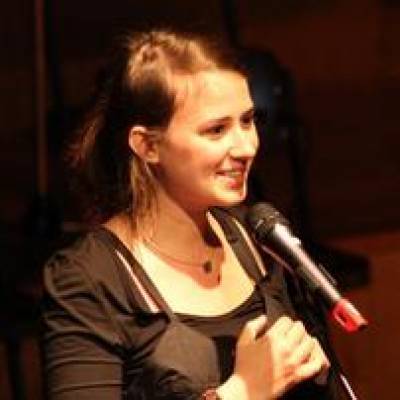
Maud's well-received debut volume of poetry Ik ben mogelijk (I am possible) was published by Querido. According to de Volkskrant, which awarded her with the Flanders-Netherlands Vrouw Debuutprijs 2011-2013, the volume is "a rich, intense collection". Maud reached the finals of the World Championship Poetry Slam in 2012 and the Leids Cabaret Festival in 2014.
Maud will be visiting the UCL Dutch department from 1-9 March as part of a translation project with Sheffield and Nottingham.
The performance starts promptly at 6pm and will be followed by a drinks reception at 7pm.
The performance will be in Dutch.
With thanks to Flanders House for generous support.
Read about the poetry evening on our blog or watch the podcast!
- 10 February 2015: Inaugural lecture, Professor Jason Peacey*
6.30pm, Wilkins Gustave Tuck Lecture Theatre, 2nd Floor, South Junction, Wilkins Building, UCL, Gower Street, London, WC1E 6BT
Register via EventbritePlucked Hens and Principals: Tackling Dutch Politics in Seventeenth Century England
Despite growing awareness about the cultural, economic and social interactions between different parts of Europe in the early modern era, political historians of the period generally remain wedded to a picture of separate and more or less competitive states, which sometimes forged dynastic, political and confessional alliances, but which frequently found themselves in conflict as well. This talk will offer new perspectives on seventeenth century European politics, by drawing attention not just to the English fascination with the Dutch political system, but also to contemporary recognition of the need to work with and through Dutch institutions, and to confront the limitations of state sovereignty.
Professor Jason Peacey (UCL History)
Jason Peacey has taught early modern British history at UCL since 2006, and his research focuses on political culture and the history of communication, most obviously in terms of the print revolution and the birth of journalism. His publications include 'Politicians and Pamphleteers. Propaganda in the Civil Wars and Interregnum' (2004), and 'Print and Public Politics in the English Revolution' (2013). This talk involves early results from a major new project on Anglo-Dutch political culture in the seventeenth century.
- 2 February 2015: Book launch - Cunegonde's Kidnapping
5-7pm, Arts and Humanities Common Room, G24, Foster Court, UCL
Register via EventbriteCunegonde's Kidnapping: A Story of Religious Conflict in the Age of Enlightenment
Join us for the UK launch of Professor Kaplan's new book, chosen as Book of the Week by the Times Higher Education Supplement and published by Yale University Press.
"In a remote village on the Dutch-German border, a young Catholic woman named Cunegonde tries to kidnap a baby to prevent it from being baptized in a Protestant church. When she is arrested, fellow Catholics stage an armed raid to free her from detention. These dramatic events of 1762 triggered a cycle of violence, starting a kind of religious war in the village and its surrounding region. Contradicting our current understanding, this war erupted at the height of the Age of Enlightenment, famous for its religious toleration.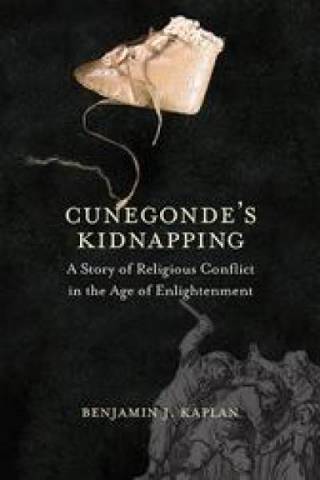
Cunegonde's Kidnapping tells in vivid detail the story of this hitherto unknown conflict. Drawing characters, scenes, and dialogue straight from a body of exceptional primary sources, it is the first microhistorical study of religious conflict and toleration in early modern Europe." Professor Ben Kaplan (UCL History)
Professor Kaplan specialises in the history of the Low Countries in the sixteenth and seventeenth centuries, and in the religious history of early modern Europe. He holds the chair in Dutch history at University College London and is co-convenor of the Low Countries Seminar at the Institute of Historical Research.
Professor Kaplan will give a short talk at 5.30pm, followed by a drinks reception.
- 29 January 2015: Book launch - The Dutch Language in Britain*
- More information and registration via ALCS website
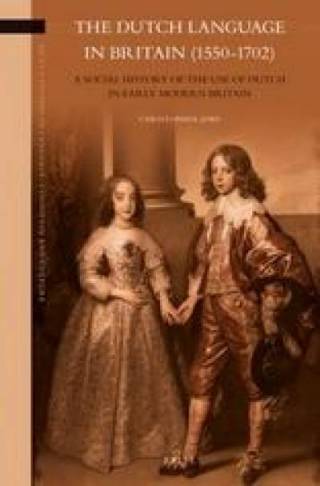
ALCS member Dr Chris Joby will launch his new publication The Dutch Language in Britain. At this festive presentation the author will give a short introduction to the book, which will be available at a special discount.
In The Dutch Language in Britain (1550-1702) Christopher Joby offers an account of the knowledge and use of Dutch in early modern Britain. Using extensive archive material from Britain and the Low Countries, Chris Joby demonstrates that Dutch was both written and spoken in a range of social domains including the church, work, learning, the home, diplomacy, the military and navy, and the court. Those who used the language included artisans and their families fleeing religious and economic turmoil on the continent; the Anglo-Dutch King, William III; and Englishmen such as the scientist Robert Hooke. Joby's account adds both to our knowledge of the use of Dutch in the early modern period and multilingualism in Britain at this time.
2014
- 4 November 2014: I died in hell - (They called it Passchendaele)
- "We can no longer speak to those who fought in the trenches. But we can speak their language. In German, French, Italian, Dutch, Russian and Turkish with English narration and surtitles, the imaginative response to conflict will be explored in a unique multimedia performance. From the euphoria of 1914 to the disillusionment that soon set in, video art combined with spoken and written word will bring war poetry to life and reveal new European perspectives on WW1."
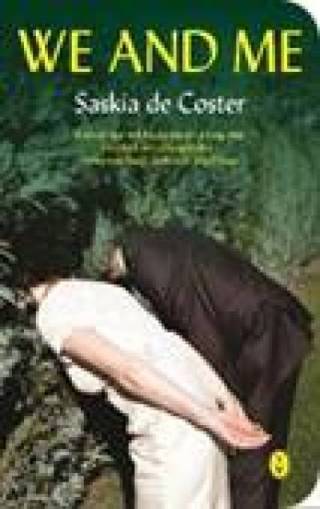
Read about this event on our blog.
Programme and artistic direction by Flemish-Dutch cultural institution Ons Erfdeel, organised by the Centre for Low Countries Studies at UCL with support from:
- 22 October 2014: Research seminar with Dr Jaap Grave
4-5pm, Italian seminar room, Foster Court, room 351-353
Dr Jaap Grave, visiting scholar at the Centre for Low Countries Studies from 12-26 October 2014, will lead a research seminar on 'Fluid Texts: Transnational Transfer and Dutch Literature'.
Dr Grave will speak about his recent research as part of the collaborative research project 'Fluid Texts: the Transnational Transfer, Circulation and Perception of Dutch Fiction 1850-1990' which describes the various routes that the 25 most translated oeuvres in Dutch literature, including adaptations (such as film, radio play), travelled in and outside the Dutch literary system in the period 1850-1990.
Please contact Jane Fenoulhet to register for the seminar
- 9 October 2014: How surreal is the Belgian language conflict?
6.30-7.30pm, Medical Sciences G46 H O Schild Pharmacology LT
Prof. dr. Wim Vandenbussche, Vrije Universiteit Brussel
Belgium fosters an infamous reputation as a perennial language conflict area where speakers of Dutch and French struggle to keep their country from falling apart. In the currently ongoing attempts to form a national government (4 months beyond election day) politicians from either side of the language border seem once again to be deadlocked in their mistrust of the 'other' language community.
How ironic is this position for a country that houses the seat of the European Union, functions as a centre of international collaboration, and has a capital that ever more turns into a true linguistic melting pot?
A look at the fascinating sociolinguistic history of Belgium may contribute to a better understanding of the socio-economic and political facts that underlie the present-day linguistic animosity between Flemings and Walloons. It may equally show that the 'Belgian model' of extensive regional autonomy within a federal state is worth pursuing, no matter how surreal it may appear at first sight.
Wim Vandenbussche is professor of Dutch linguistics, sociolinguistics and language history at the Vrije Universiteit Brussel. His research focuses on the social history of Dutch, with particular attention to the age of nationalism.The lecture will be followed by a reception in the A&H Staff common room (G24, Foster Court).
- 11 September 2014: Poetry evening with Ester Naomi Perquin
5.45-7.45pm, Senate House, room 349, Malet Street, WC1E 7HU
Join us for an evening of poetry with award winning Dutch poet Ester Naomi Perquin. Ester worked as a prison guard in order to finance her creative writing classes in Amsterdam. Her debut volume, Servetten halfstok (Napkins at Half-Mast), was published in 2007 and received a number of prizes including the Liegend Konijn prize and the Lucy B. and C.W. van der Hoogt prize. Her latest volume, Celinspecties (Cell inspections), was published in early 2012 and was awarded the VSB Poetry Prize for the best volume of 2013.
Ester will read from her new work and you do not need to understand Dutch to enjoy Ester's beautiful, rhythmic poetry; the poems will also be read in translation and non-Dutch speakers are warmly welcomed. Ester will be joined in conversation by Stefanie van Gemert, whose blog about Ester's last visit to UCL can be read on the UCL Events blog.
Tickets are FREE and can be reserved via Eventbrite.
- 10 September 2014: Opening lecture by Dr Henriëtte Louwerse
5.30-7.30pm, Gustave Tuck lecture theatre, Wilkins Building, WC1E 6BT
Dr Henriëtte Louwerse from the University of Sheffield gave the opening lecture of the 10th biennial conference of the Association for Low Countries Studies. The lecture was followed by a reception in the North Cloisters.
"Community, like culture, is a problematic, inaccurate and fluid term that nonetheless wields tremendous power in its ability to conjure up connotations of warmth, sharing, understanding, recognition and even healing. Community is often mobilized to give expression to an ideal, a promise of oneness, of 'a fusion of multiple individuals into one subject position' (Lee 2009: 2). However it is exactly this promise of fusion that is also suspect: warmth becomes stifling; sharing turns into suppression of difference; and oneness the embodiment of totalitarian logic.
Much contemporary art and literature responds to this universal tension between the need for individuality and the desire to belong. In this contribution I will look at the response to the challenge of community in the work of two contemporary artists, Francis Alÿs and Hafid Bouazza."
- 10-12 September 2014: ALCS conference
Foster Court and Medawar Building, University College London, WC1E 6BT
Discord and Consensus: 10th Biennial Conference of the Association for Low Countries Studies
All countries, regions and institutions are ultimately built on a degree of consensus, on a collective commitment to a concept, belief or value system. This consensus is continuously rephrased and reinvented through a narrative of cohesion and challenged by expressions of discontent and discord.
The history of the Low Countries is characterized by both a striving for consensus and eruptions of discord both internally or through outside challenges. The ALCS Biennial conference aims to explore consensus and discord in a Low Countries context along and across broad cultural, linguistic and historical lines.
- 19 June 2014: The Ambiguity of Virtue*
Drinks from 6pm in the Haldane Room, Wilkins Building, Lecture 6.45pm in Pearson G22, Pearson Building NE entrance, UCL, Gower Street WC1E 6BT.
Professor Bernard Wasserstein
The Ambiguity of Virtue tells the story of Gertrude Van Tijn's efforts to organize Jewish emigration from Nazi territory. She played a central role in this enterprise. Bernard Wasserstein discusses the methods she deployed to enable thousands of Jews to escape with their lives. In the course of her work, she faced difficult moral choices. Some called her a heroine; others denounced her as a collaborator. Drawing on a wealth of contemporary documentation, including German and Dutch archives as well as Van Tijn's personal papers, the book raises crucial questions about German policy towards the Jews, Jewish reactions to the Nazi menace, and about Dutch, American and British responses to the genocide of the Jews. In so doing it touches on some of the central moral-historical issues of the twentieth century.
Register on Eventbrite. This event is organised by the Institute of Jewish Studies.
- 28 May 2014: Festival of the Arts*
6.30-8pm, Wilkins Gustave Tuck Lecture Theatre, 2nd Floor, Wilkins Building, Gower Street, London, WC1E 6BT
'You must read this book!': Nobel prize winner J.M. Coetzee's translation of A Posthumous Confession
As part of the UCL Festival of the Arts, Professor Jane Fenoulhet will tell us why Marcellus Emants' novel A Posthumous Confession is a must-read book, competing against colleagues from across UCL who will try to convince you that Rudyard Kipling's Mrs Bathurst and José Saramago's The Cave should take top place on your reading list.
'Since the time of Rousseau we have seen the growth of the genre of the confessional novel, of which A Posthumous Confession is a singularly pure example. Termeer [the narrator], claiming to be unable to keep his dreadful secret, records his confession and leaves it behind as a monument to himself, thereby turning a worthless life into art.'
-J. M. Coetzee, winner of the Nobel Prize in Literature 2003.
- 17 March 2014: Centre launch with Professor Lisa Jardine
- The Centre's official launch took place on Monday 17 March with a lecture by Professor Lisa Jardine on 'Sir Isaac Newton and Christiaan Huygens: Anglo-Dutch Science and Politics around 1688'.
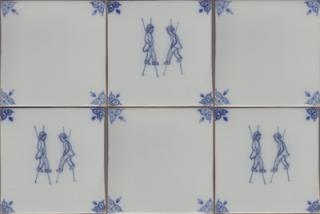
Professor Jardine is the director of the Centre for Editing Lives and Letters and the Centre for Humanities Interdisciplinary Research Projects at UCL and her book Going Dutch: How England Plundered Holland's Glory won the 2009 Cundill International Prize in History.
The lecture was followed by a reception in the North Cloisters. Read more about the event on our blog.
- 31 January 2014: An Evening with Abdelkader Benali
Students, alumni and friends of the UCL Dutch department are warmly invited to a talk and wine reception organised by the UCL Centre for Low Countries Studies.
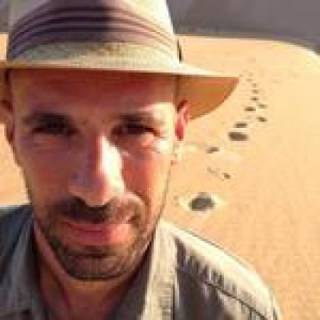
Biography
Abdelkader Benali was born in Morocco. When he was four years old, he and his family, of Berber background, migrated to the Netherlands and settled in Rotterdam.
When he was twenty-one his debut novel Bruiloft aan zee ('Wedding by the Sea') appeared and was a huge critical and commercial success (1997). It was translated into many languages and nominated for the renowned Libris Prize for Literature that he received for his second novel, De langverwachte ('The Long-Awaited', 2002) in 2003.
In addition to novels and plays, Benali has published literary travel reviews, such as his text about Skopje for citybooks.eu, as well as essays and reviews in Dutch newspapers and magazines and The Guardian.
*Indicates an event not organised by the Centre.
 Close
Close


